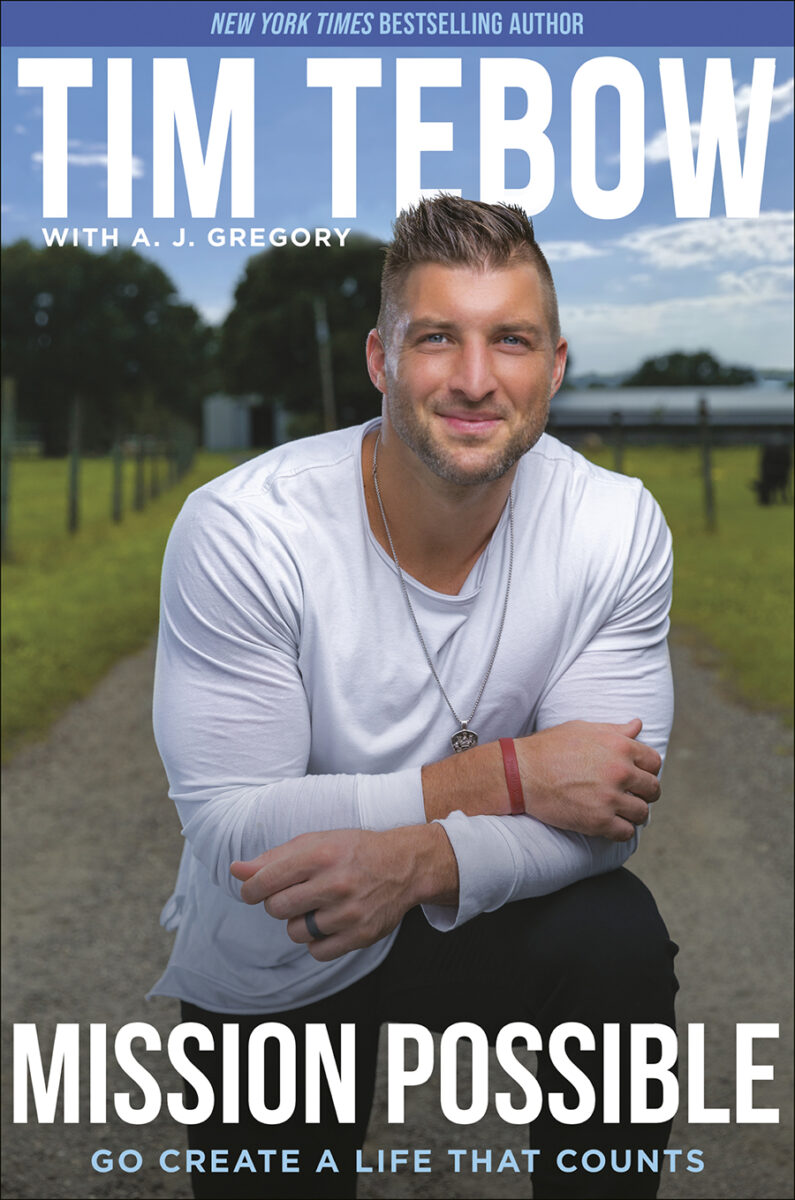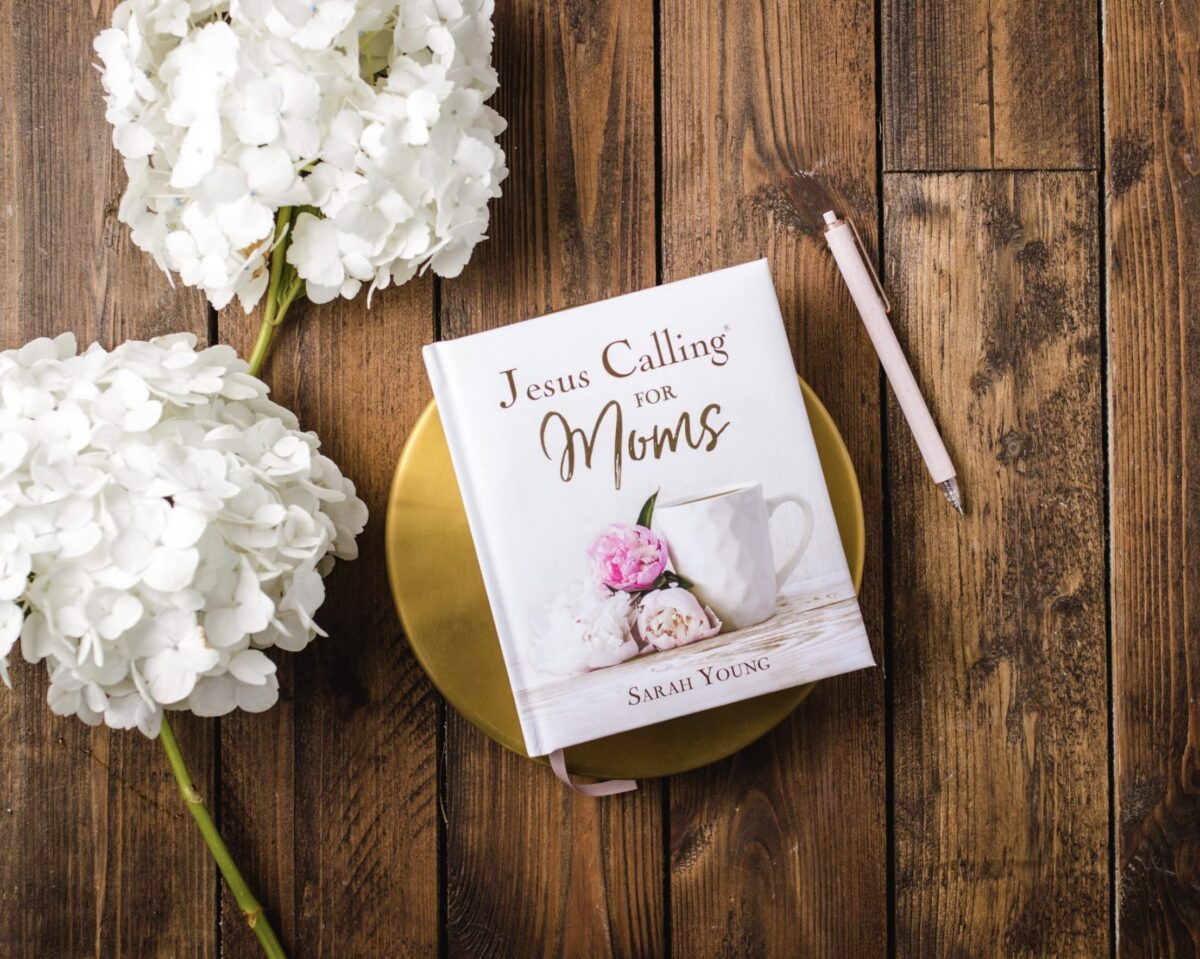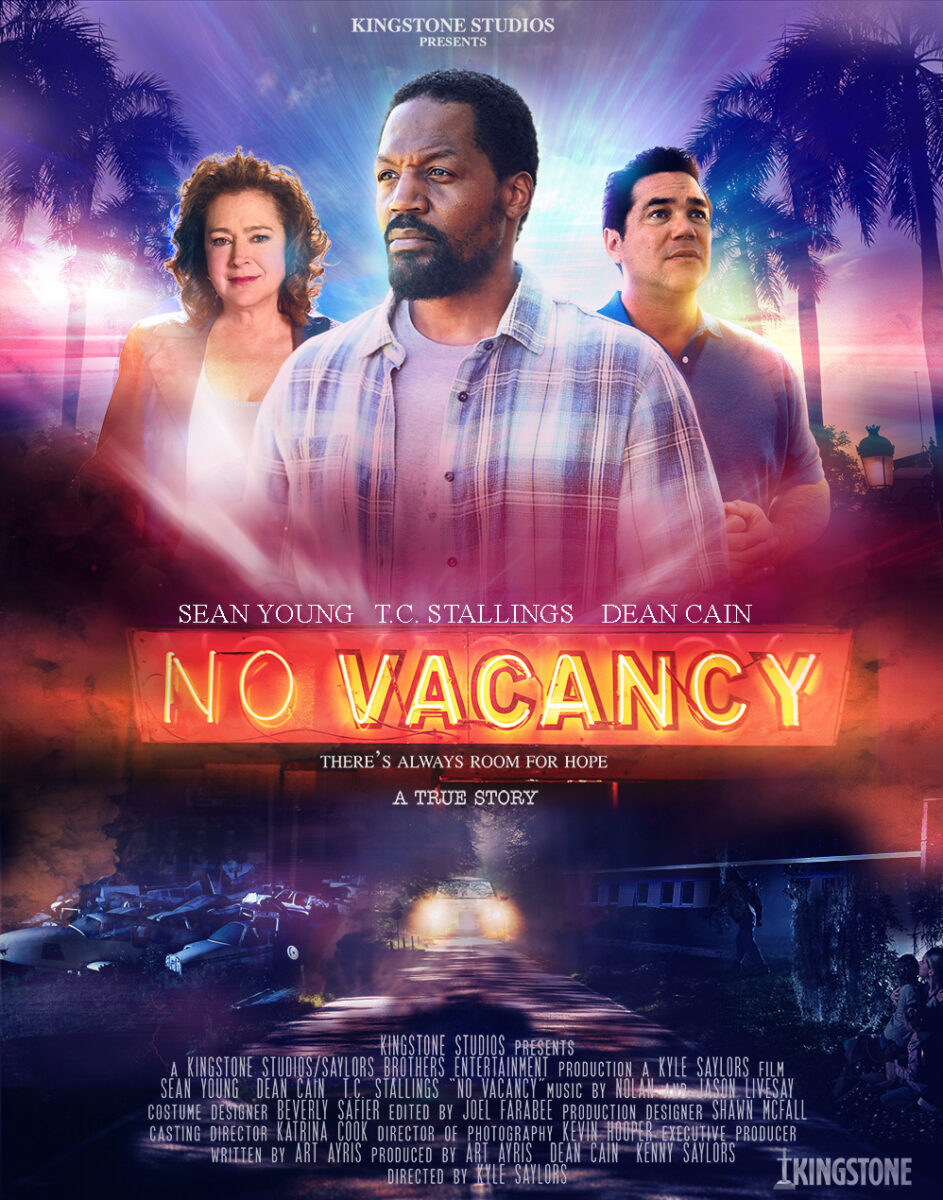God Uses Us Through Our Scars: Tim Tebow, Merry Clayton, & Dean Cain
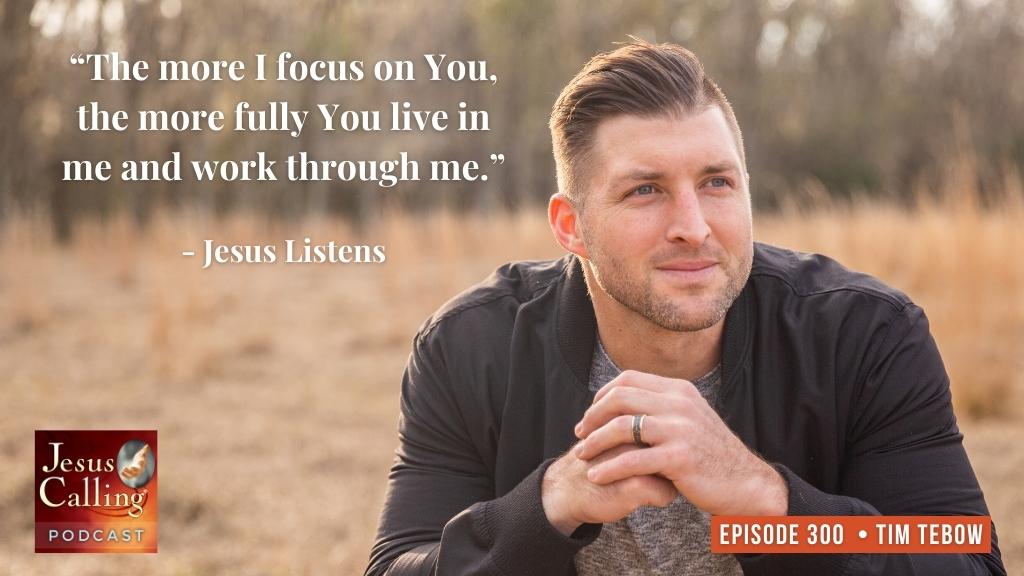
Tim Tebow: I believe every single one of us has been given a mission. I don’t think we’re here by happenstance. I don’t think we’re here by chance. I believe that God has a divine design for every single one of us. Because sometimes, it really does feel like you’re living a rollercoaster, but we get to get off, and we get to hold on to a firm foundation, and that’s the Word of God.
God Uses Us Through Our Scars: Tim Tebow, Merry Clayton, & Dean Cain – Episode #300
Narrator: Welcome to the Jesus Calling Podcast. This week we celebrate a special landmark—our 300th episode. Many thanks to you—our listeners—for coming back to our show week after week to hear the stories of real people, just like yourself, who have found hope and peace in the Word of God and in Jesus Calling.
For this very special episode, we have three guests who have all experienced their share of scars from the hard parts of life, but have found a way to see their scars as badges of honor, and they recognize how God has strengthened them through their pain so that they can reach others with His message of love and healing. We’re talking with NFL and MLB star Tim Tebow, singer Merry Clayton, and actor Dean Cain.
Let’s start things off with Tim Tebow.
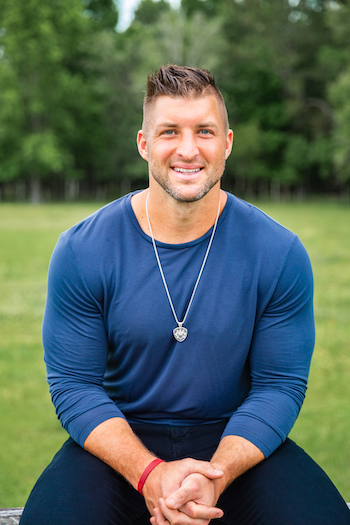
Tim: Hey, guys, I’m Tim Tebow. And I guess God gave me a platform from sports, but I feel like my biggest mission and calling is so much different and more important than a game would ever be, and I think it’s to love Jesus and love people. But I think even more specific than that, it’s to fight for people who can’t fight for themselves.
Lessons in Humility
My parents were missionaries and still are. I was the baby of five, I have four older siblings. And honestly, my first memories were about sports, about trying to win. But then also, I wanted to be a Navy SEAL, a cowboy, a preacher, all these other things. I was just very driven and competitive, and I loved it. And it was something that my parents encouraged and embraced, but what was also so cool is they never tried to diminish my drive and competitiveness. They just help steer it, which I’m so grateful for. They never tried to diminish the way God made me.
Even from an early age, I think sports and my walk with the Lord were so intertwined. And even from my first sporting activity, playing baseball right down the street at Normandy Baseball Park, I was on the White Sox and number thirty-five, just like my favorite player, Frank Thomas. And after the first game, I was super arrogant and the next day at church, I wanted to tell everybody how I did, how many homeruns I hit. You know, like people care how a five-year-old did in tee-ball.
But what was cool is my parents already used that to start helping us—by helping, I mean making us memorize scripture. And I remember the first verse my parents made me memorize as a five-year-old boy: “The greatest among you will be a servant. Whoever exalts himself will be humbled, whoever humbles himself will be exalted.”
I didn’t understand it, but my parents knew I was so competitive and I wanted to play and I loved it. And so they instilled a rule for me and my siblings that before we played a sporting activity, we’d have to memorize scripture verses—and for me, primarily on humility. And so before we would play, we had to memorize these verses and quote them to my dad. They’d have to be word for word, and he was super strict on it, too.
And it was crazy: along the way, you didn’t even realize they were impacting you until all of a sudden, years down the road and you would think about it—and then that word that they’d made us hide in our heart, God would bring it back to our head at different moments.
We’ve All Been Given a Mission
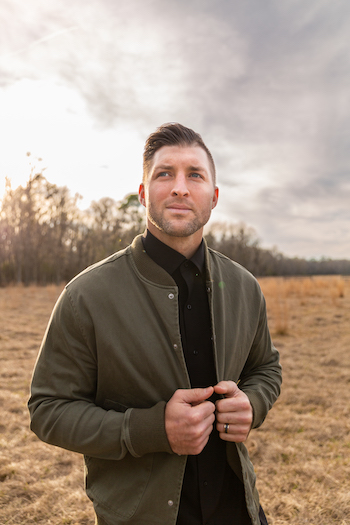
If I didn’t know what God says about me, then it would be so easy to get caught up with the highs and the lows. One day I could be here and the next, I could be here.
In the same year, I was voted one of the most popular athletes in America, and I was cut. So in that same year, am I going to be at the high or am I going to be at the low? But I’m so grateful that when I hold on to God’s truth, I don’t have to be at either, because I was neither one of those. I was who God says I am, and I’m so grateful for that along the way.
“If I didn’t know what God says about me, then it would be so easy to get caught up with the highs and the lows.” – Tim Tebow
When you look at what the Bible has to say about our lives, we are fearfully and wonderfully made [Psalm 139:14]. Like fearfully meaning awesome and wonderfully meaning unique and set apart.
So if you think about the seven wonders of the world, why are they different? Well, because they’re unique, they’re set apart. They’re different than every other thing. We’re more unique than they are. We’re more set apart than they are. We are fearfully and wonderfully made, we are unique, we are set apart.
But we are here to love God and love people. And He has made it possible through the blood of the cross to have a mission-possible life, one that truly counts. Not one that is about one day, but one that is about this day. This day, it is a chance to make our life count.
“We are here to love God and love people. And He has made it possible through the blood of the cross to have a mission-possible life, one that truly counts. Not one that is about one day, but one that is about this day. This day, it is a chance to make our life count.” – Tim Tebow
How Do We Know What Our Mission Is?
It’s not the easiest thing, and people ask me all the time, “How do I know what my mission is? How do I know what my calling is? How do I know what my purpose is?”
And I always start with the same thing: “I don’t know.” But then I’ll encourage them. “Have your eyes ever been open to a need, to a problem, to a people group, to a unique situation? Has your heart ever been pricked to want to do something? Because if so, if those two things have happened, gosh, I mean, that might be God saying, ‘Hey, I want you to go meet this need. I want you to go love this person. I want you to go help in this area. I want you to problem solve. I want you to create a solution.’”
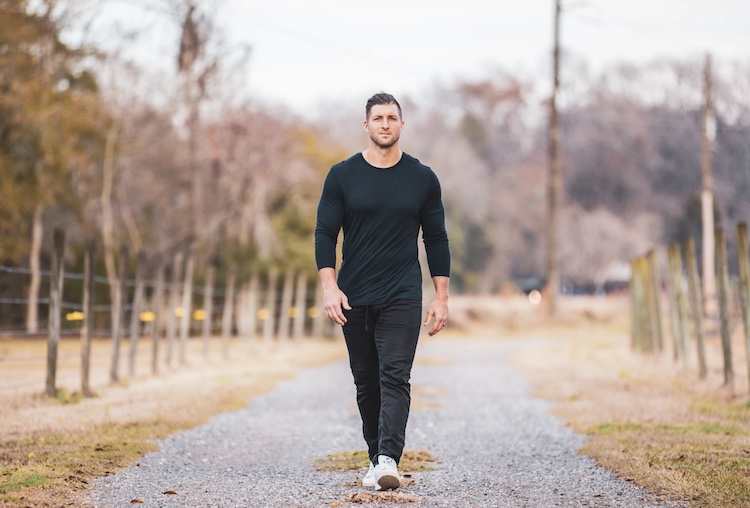
And that’s where we can’t listen to emotions. We’ve got to go back to our convictions when God pressed upon our heart when God opened our eyes to that problem—and going back to the mission when we believe God gave it to us and continuing to hold fast. That’s why I think mission statements are important.
I believe non-negotiables are important. And most importantly, God’s truth is important, and we have to hold firm to all of that because if not, it’s so easy to have our mission drift. And there are so many things I believe that we’ve got to go back to stay firm on the mission that God has called us to.
I’ve gotten caught up in it so many times in my life, those emotions. I’ve gotten caught up in thinking that a game matters more. I’m going to speak at the Omni that’s attached to the Cowboys training center, and it’s a night I’m getting ready to go present the Gospel there. But I get a tour around the Cowboys facility, and it’s nicer than any team facility I ever played for. And I got to tell you, when I’m walking around, I’m thinking, Man, if I could have just played for this team . . . man, God, why wouldn’t You let me do this? This would’ve been amazing. This would be awesome.
And you know what’s filling my heart? Pride, bitterness, envy. I wish. Man, God, why couldn’t this be the plan You had for me? This would’ve been unbelievable. I would have told people about You, this would have been awesome.
And the whole time I’m walking around, I’m seeing all of this. And it’s so easy to get caught up in those emotions because they speak really loud. Ask for truth to speak louder.
“It’s so easy to get caught up in those emotions because they speak really loud. Ask for truth to speak louder.” – Tim Tebow
Removing the Barriers to Reaching Our Mission
I think one of the things I really appreciate about Jesus Calling and Jesus Listens is that it does remove so many barriers. It’s something that’s easy and accessible. It’s encouraging people to pick it up, and they find truth, and they find encouragement, and it can help lead them to the next step of their walk with Jesus and their faith journey.
I just really believe, and I so want the church to do this, to remove the barriers is to remove the no’s. And I think one way that we as the church need to do that is to be on the same team, to be on the same page. It doesn’t mean that we can’t have disagreements. I think that’s okay. It’s just we can’t put those disagreements above Jesus, above our mission, above our calling, above loving the Lord your God with our hearts. So mind, strength, and loving your neighbor as yourself. That is what we’re supposed to do.
I also believe that’s iron sharpening iron, but iron sharpening iron is not above Jesus’ mission and above Jesus’ calling for our lives. We have to put that first, and we have to put the other in its place. That needs to happen. And I want it to happen.
I want us as a church, let’s rally instead of fighting over who wears ties and who doesn’t, instead of fighting over how we worship and how we don’t . . . like, let’s come together and let’s live out the Great Commission, and let’s live out loving God and loving people.
You know, I believe convictions are rooted in truth, and I think they’re also rooted in how God has pricked your heart, and what He’s asking you to do. And for me, that being really to fight for people with special needs, to fight for people who are being trafficked, to fight for those who have been abandoned, to fight for those who are being persecuted. Like specifically for me, I really believe God has touched my heart for that. He’s saying, “I want you to go help them. I want you to go meet that need. I want you to go to where they are.” And that’s why a big part of our mission here is to be with people in crisis, chaos, and darkness, to be with people on their worst day, not their best day.
We can take heart when it’s hard. We can take heart when we have people who are criticizing us. We can take heart because He overcame the world. That’s why we can choose courage, because even in the midst of the trials and the midst of a tribulation, the midst of the negativity, in the midst of the criticism, we know all we have to do is keep fighting because He wins the game for us.
“We can choose courage because even in the midst of the trials and the midst of a tribulation, the midst of the negativity, in the midst of the criticism, we know all we have to do is keep fighting because He wins the game for us.” – Tim Tebow
Narrator: You can find Tim’s latest book Mission Possible: Go Create a Life That Counts, everywhere books are sold.
Stay tuned to Merry Clayton’s story after a brief message.
A Meaningful Gift: Jesus Calling for Moms
Give the moms in your life the beautiful gift of encouragement, reassurance, and peace with Jesus Calling for Moms!
Fifty Jesus Calling devotions speak to the power of love, the gift of strength, trusting God’s guidance, and so much more. Also included are: a prayer for mothers from Sarah Young, Scripture verses, journaling prompts and space for women to write their own prayers.
Order Jesus Calling for Moms today!
Narrator: Our next guest is singer and actress Merry Clayton, who blazed a trail for backup singers in the ‘60s and ‘70s with her memorable vocal additions to major artists’ hits, like The Rolling Stones’ “Gimme Shelter” and Lynyrd Skynryd’s “Sweet Home Alabama.”
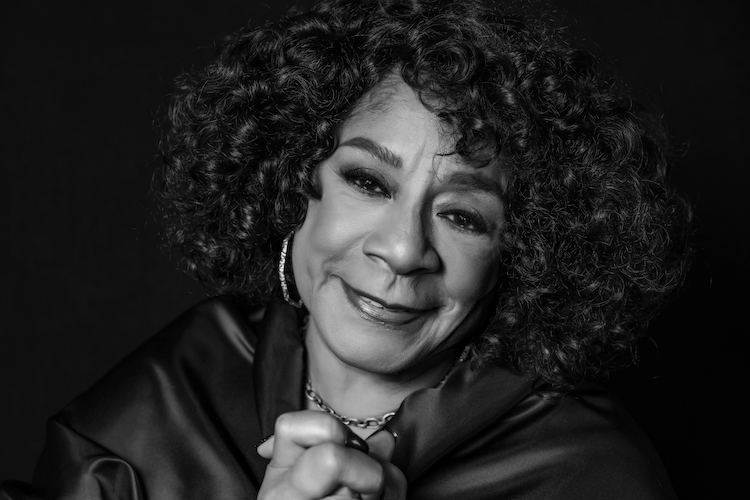
Merry enjoyed many years of being a working backup vocalist, lending her voice behind the scenes, and also had a solo career. As she looked toward the second half of her life, Merry planned to step out once more on the solo stage, but a horrific accident in 2014 threatened to steal her dream. She describes how she leaned on God in this time, and what inspired her latest album Beautiful Scars.
Merry Clayton: Hi, this is Merry Clayton. And I am a singer, an actress, a writer, a child of the Most High, and a survivor.
A Move to California Sparks a Musical Dream
My mother was a chef in the French Quarter of New Orleans—I’m from New Orleans, and my dad was a minister. So we lived in New Orleans until I was eight years old. My baby brother got very ill from the dampness there. And the doctor told my mom, “If you don’t get him out of this city within a year, he won’t be with us anymore.” So we left.
I had an aunt who that lived here in Los Angeles, my Aunt May. She was my mother’s baby sister, and my aunt said, “Oh, you come and bring those children.” So we came to California. I’m so glad my mother made that decision, because this is where my career was. This is where my destiny lay. It was right here in Los Angeles.
When I was going into the fifth grade, I had a teacher. His name was Richard Stiliyan, and he and my mother had a meeting and he told my mom, “Merry’s really, really talented. I have a great friend of mine, his name is Carl Craven, and he’s a music teacher, he’s a vocal coach. He coached some of the biggest in the business.” He said, “I’ll pay for a whole year for Merry, if you would let her take these classes because she’s going to be something special.”
Every Saturday we would make a trek on the bus, my sister and I, had this beautiful ride to Hollywood on the bus and to these vocal lessons, and this gentleman taught me how to breathe, how to hold a note until tomorrow. He taught me skills that I still use today, you know?
Merry Sings with the Greats
My dear friend Billy Preston called me one day and said, “What are you doing?”
I said, “I’m folding towels.”
“You’re folding towels? Drop everything, you need to come.”
And I said, “Well, why?”
“You need to come and sing for Ray.”
I said, “Ray who?”
He said, “Ray Charles. Put on something really cute, and come up and sing for Ray.”
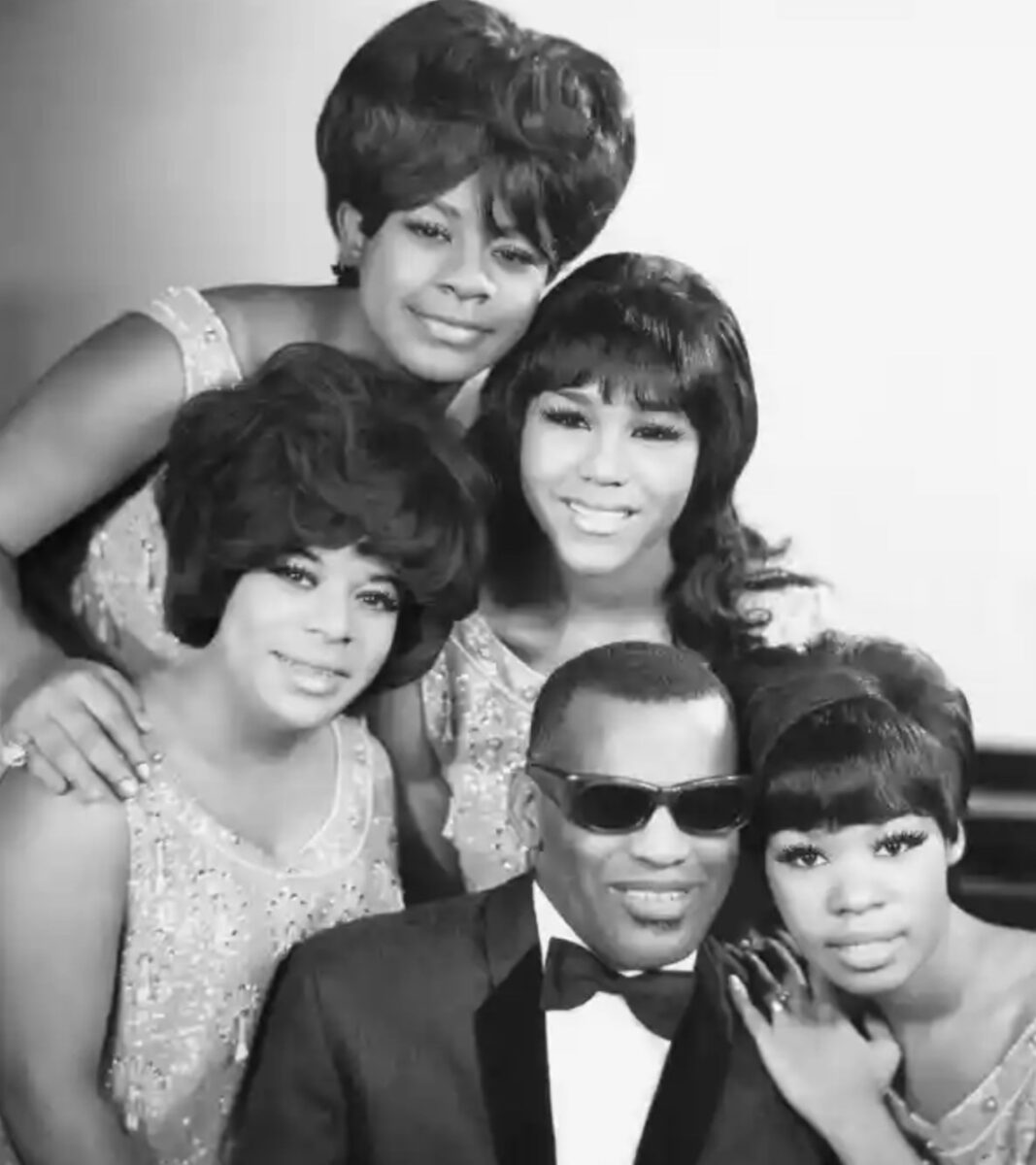
And by the time I left, Mr. Charles gave me a contract for my parents to see. He said, “We’d love for you to come out on tour with us.”
I said, “Well, you’ll have to speak to my mom and dad about that. I don’t know about no tour.”
So he did. And I was able—with Billy, of course—to go out a few months out on this tour where I met Ray’s conductor. Wonderful, wonderful man, great jazz musician and had his doctorate in music. Really a very lovely man. And two years later, we had fallen in love.
So after I met Curtis, after two years, we became engaged, and we worked with Ray for a little while. And then we decided—I spoke to Curtis, spoke to my parents—I said, “You know what? I want my own band.”
I think they looked at me like I was crazy. “You want your own band?”
I said, “I don’t want a band this big. I want my own group, and I want to record my own records, and I want to do me.”
Merry’s Solo Career Takes Flight
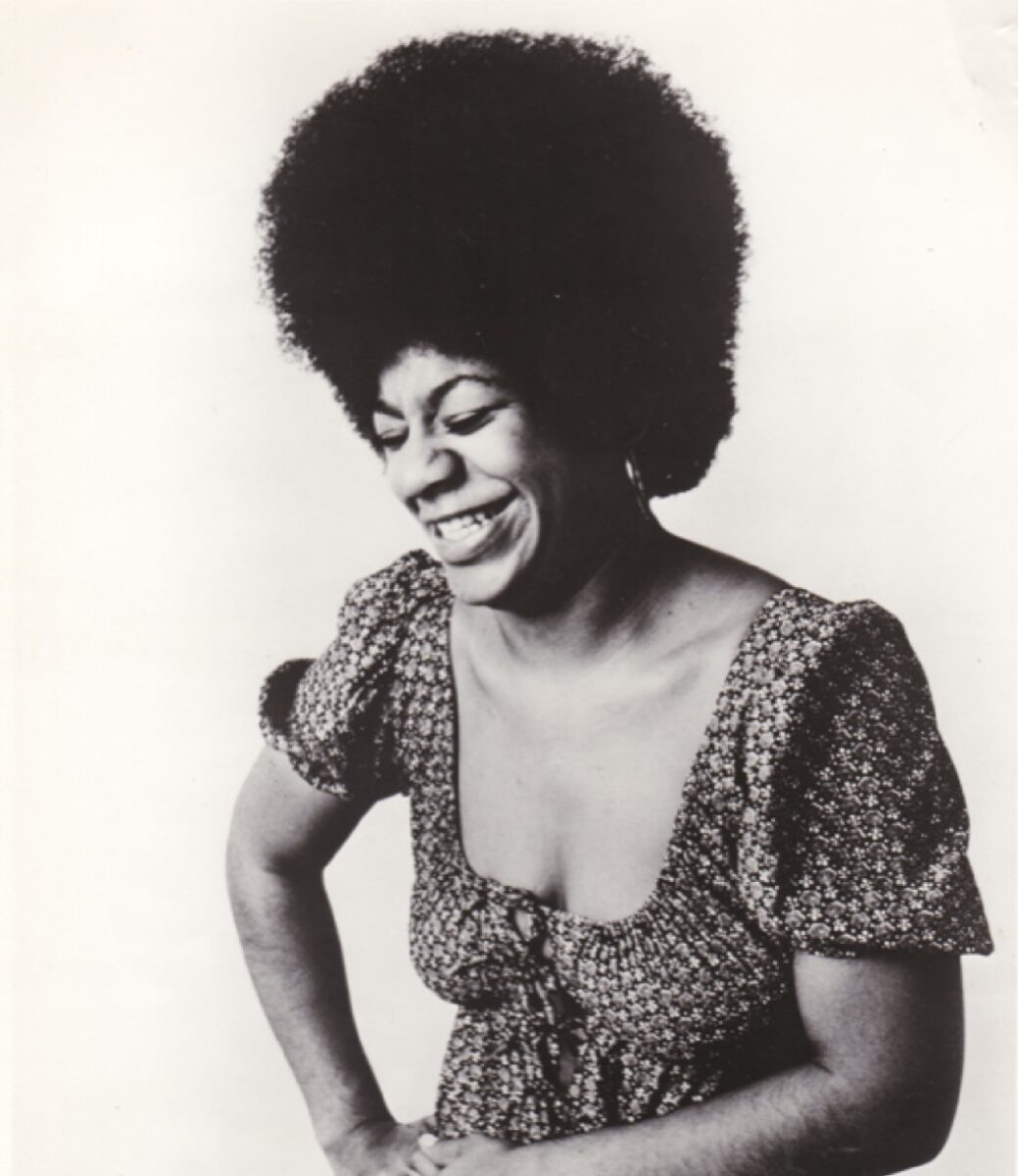
So we went about the business of getting a manager and decided to put a group together. He wanted to put up a group of girls around me, which he did, a group called the Sisters Law. I worked with them for a couple of years, and we got a beautiful record deal with this company.
I still wanted my own band, and I wanted to do my own songs. We went to see Lou—Lou was at A&M with Herb Alpert and Jerry Moss, and his company was called Ode Records. So we went to speak to Lou, and Lou offered me a fantastic deal. And of course, we talked about it, my husband prayed about it, we talked about it, talked to my parents about it, we talked to the family about it, a big meeting about it. We prayed over it and we blessed it, of course. And we wanted God’s will to be done in it. Whatever it was, we wanted His will to be done—not me, not my will, but His will, because that’s the way we live.
So I signed my deal about two or three weeks later, and went about the business of meeting with Lou several times. And we just had a great time.
“Whatever it was, we wanted His will to be done—not me, not my will, but His will, because that’s the way we live.” – Merry Clayton
A Tragedy Brings Beauty Through the Scars
Narrator: In June of 2014, Merry was injured in a near-fatal car crash in L.A., suffering severe trauma to both legs, resulting in a double amputation at the knees. Merry woke up after the surgery with no recollection of the accident, but knows exactly Who got her through it.
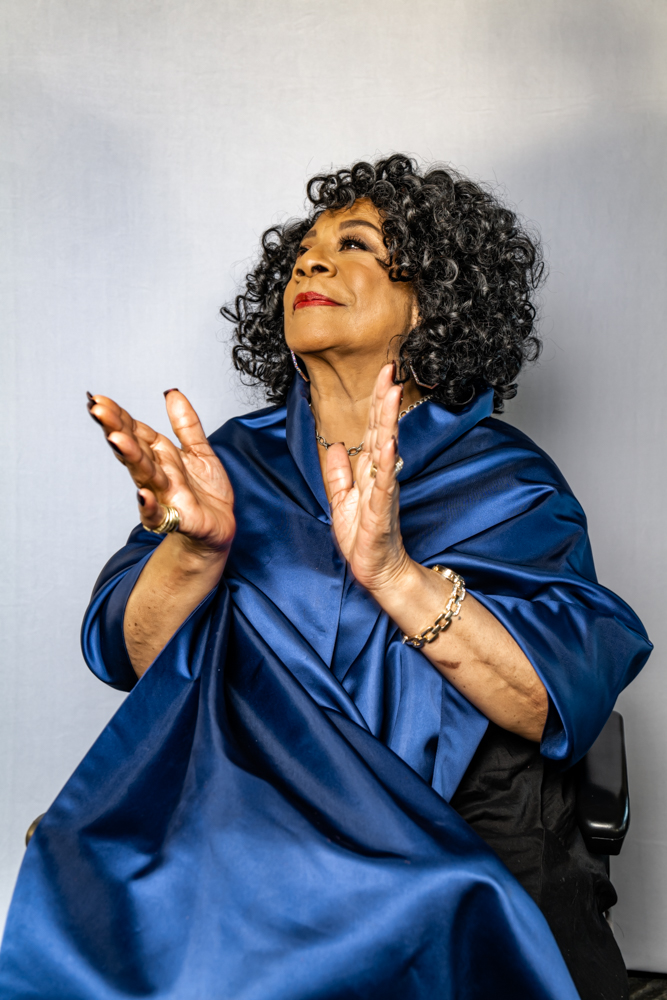
Merry: I have to pay homage to God, and I really need to give Him honor, glory, and praise because He was the one that brought me through and no one else. He brought me through. I didn’t stay in it. He brought me through. And I’m grateful for that.
I had the greatest doctors in the world, and they would come six deep every morning. And they said, “Oh, Miss Clayton, it’s just so good to see you, you just start our day.” They would get to the point where they would sneak me in Starbucks Coffee. And say, “Miss Clayton, we have the coffee for you. You got a word for us today?”
I said, “Yes, God is all there is, and there’s nothing else. Take that with you as you go.”
And they would just go out and shake their heads. And they would always say, “We knew Miss Merry was going to make it through because she was so positive about everything. She never spoke negative about anything. Never.”
And of course, I had five surgeries on one leg, and I was in the hospital for five months. But oh honey, the beginning of the sixth month, I came home. I was so glad to come home. I was so glad to be in my home with my family and everybody was holding it down while [I was] out and Lou. And it was just wonderful.
I’ve been knocked down, I’ve been kicked down, but faith—this is the part I like—but faith bought me back, and I’m just standing here now. So these are beautiful scars I have in my heart. But it’s beautiful truth that I made it this far. Every hurt I’ve endured, every cut, and every bruise, I wear proud like a badge.
I’m praying for peace. I’m praying for love. I’m praying for people to have joy. I’m praying for the Holy Spirit to comfort these people because they need to be comforted. I’m hoping that the music I’m doing will comfort people and help them to know that God is still here. He hasn’t left us. He’s still here. We’re still in the palm of His hands.
I want people to be able to look at me and say, “There she goes. There’s peace, there’s love, there is joy.” And if I have to do it through the gift that He’s given me, so be it. I’ll give it, and I’ll give it with joy and with honor and with gladness in my heart.
“God is still here. He hasn’t left us. He’s still here. We’re still in the palm of His hands.” – Merry Clayton
Narrator: To learn more about Merry Clayton, please visit www.merryclayton.com. And you can find her album, Beautiful Scars, wherever you get your music.
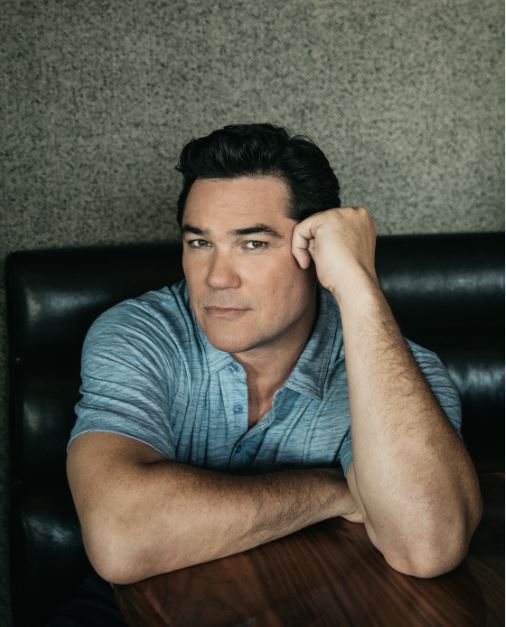
Narrator: Dean Cain is one of the most well-known TV stars of the ‘90s, stepping into the spotlight for his role as Superman in Lois & Clark. Over the years he’s become a regular on The Hallmark Channel and appeared in several films, many of which are faith-based. Dean shares about the ups and downs of Hollywood, choosing fatherhood over bigger fame and fortune, and about his latest movie No Vacancy.
Dean Cain: Hey everybody, I’m Dean Cain. I’m an actor, director, producer, filmmaker, and father.
Growing Up in the World of Film
I was raised in the hardscrabble streets of Malibu, California, so rough, rough childhood growing up, going to the beach, surfing, doing all those things.
I was born in Detroit, Michigan, but my mom moved out to California when I was three years old. By the time I was five, I grew up in Malibu.
Malibu was the most idyllic place you could ever grow up as a child. We’d literally go to the beach every day, surfing, running around. We actually lived in a trailer park, which people are like, “What? You lived in Malibu on a trailer park?”
I grew up in the world of film, with my father being a director and writer and my mother being an actress. And all I wanted to do is go to school and play sports, which is what I did for the longest period of time.
So I grew up going to the beach with kids and friends like Sean Penn, Chris Penn, Rob Lowe, Charlie Sheen, and Emilio Estevez. All our families were in the film business. I didn’t think of it any differently than if your family were in the construction business. Everybody did this. I thought the entire world grew up that way.
Dean Finds His Way to Faith
We weren’t a very religious family growing up. We would go to church for Christmas and Easter and a couple other things like that. But it didn’t play a huge part of my life growing up until I started getting into college.
And in fact, in college, I started taking religion courses, just trying to search and find my way and find my way to faith. I wasn’t against faith, but I didn’t really know what it was. I was too young. And it wasn’t until my son was born when I was in my thirties where it really, really hit home. I think being a parent changes you because you’re no longer the most important thing. And then you start to sort of understand the whole idea behind faith and behind God because you’re living it now. Now someone is more important than you. Becoming a father was really the biggest part of embracing my faith.
“I think being a parent changes you because you’re no longer the most important thing. And then you start to sort of understand the whole idea behind faith and behind God.” – Dean Cain
An NFL Career Cut Short and a New Dream Is Born
I went to Princeton University, and it was a great school. The reason I went to Princeton was that I knew that football and athletics couldn’t last forever, and the average lifespan in the NFL was three years. And I thought, you know, I might get a shot. I was an All-American football player at Princeton. I got a lot of notoriety because I broke some NCAA records, and that got me a look at the NFL, so I signed with the Buffalo Bills. It was actually a great situation for me. The way they played their defense, the way they set up everything, I was like, This is perfectly made for me. This is going to be great.
And then I hurt my knee.
It wasn’t getting better, sort of this nagging thing, and I thought, This can’t be a real problem, until they brought me in and said, “You have to have surgery.” And that’s kind of the kiss of death in the NFL, especially for an undrafted free agent. I didn’t realize that.
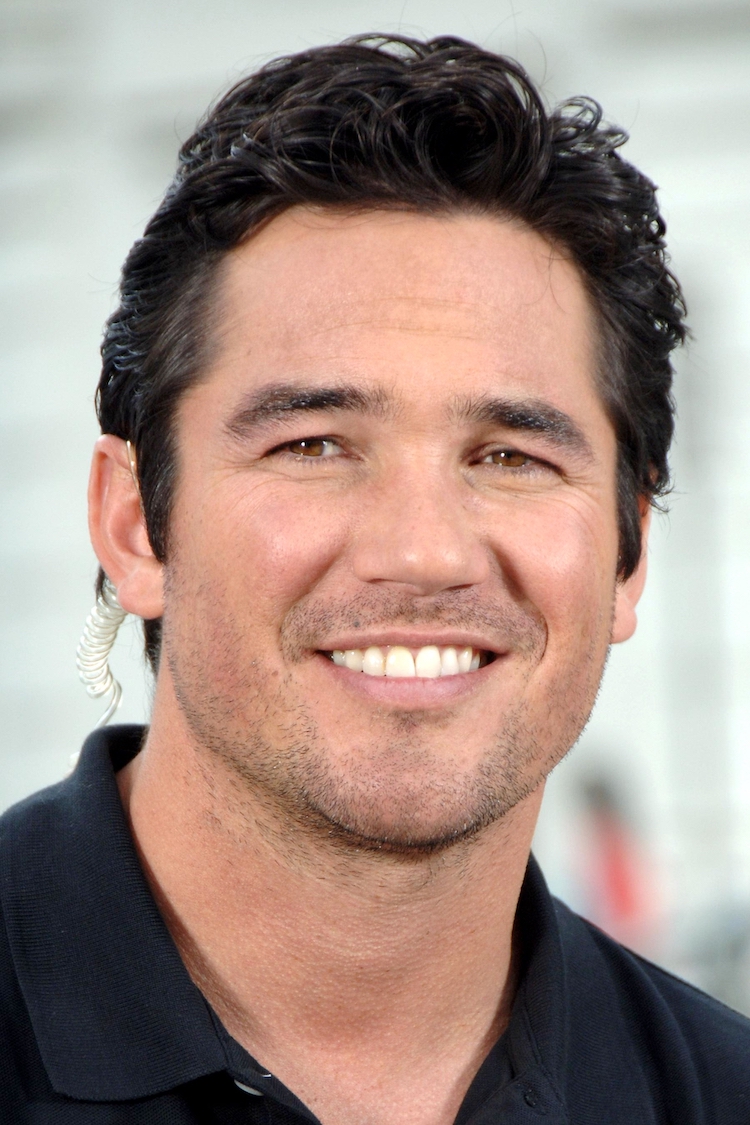
It never really got one-hundred-percent better. I was still able to be a good athlete, run around and do everything, but not at that level. I felt like if I had been able to play in a game—because it was right before the first preseason game—if I’d been able to play in a game, I always feel like they would have done more to hang on to me. I would have gone back in for another surgery. They would have really tried to sort of nurture me back, but they didn’t.
Then the two things that I had always done well, which was schoolwork and playing sports—football being the best of the bunch—were gone all of a sudden. I was like, Woah, I had to sort of start at the bottom now again.
I was watching what my friends were doing. Again, I went to Princeton, so they were going to New York City all the time in the summertime and becoming investment bankers and wearing a suit in 95 degree heat. Being in New York in a suit in the summertime is not lovely. And my dad was off making a movie, Young Guns, and I went to look at his set. I was like, This is much more fun than putting on a suit and running around in New York City. So I started making plans to become a film writer and actor and filmmaker, and it was in my head, but I didn’t think it would be thrust upon me so quickly.
I started at the very bottom, you know, going on commercial auditions with four other guys. “All right, everybody, eat these Doritos and act like you’re dancing at a party.” And I was like, My gosh, wow, how the mighty have fallen quickly. And that’s the thing. You have to put your ego in check. It was very humbling, to put it mildly, but I started doing a lot of commercials. Then I got some guest starring roles on some different shows, including Beverly Hills 90210. And then I had my shot to play Superman, and that was amazing.
And there was so much pressure on you and so much focus. It got to the point where I’d be asleep at night and I’d be going, “No, no—no more pictures, no more pictures.” That literally happened to me because there’s no way to prepare someone for that, that sort of fame and being under the spotlight.
It’s tough with today’s world, where everything you do is under a microscope on social media and those things. I’m glad those didn’t exist when I was a kid. That was my journey to playing Superman, and it was great, fun, and wonderful. But even for me, it took a big adjustment to live life under that microscope
The Choice Between Career and Being a Present Father
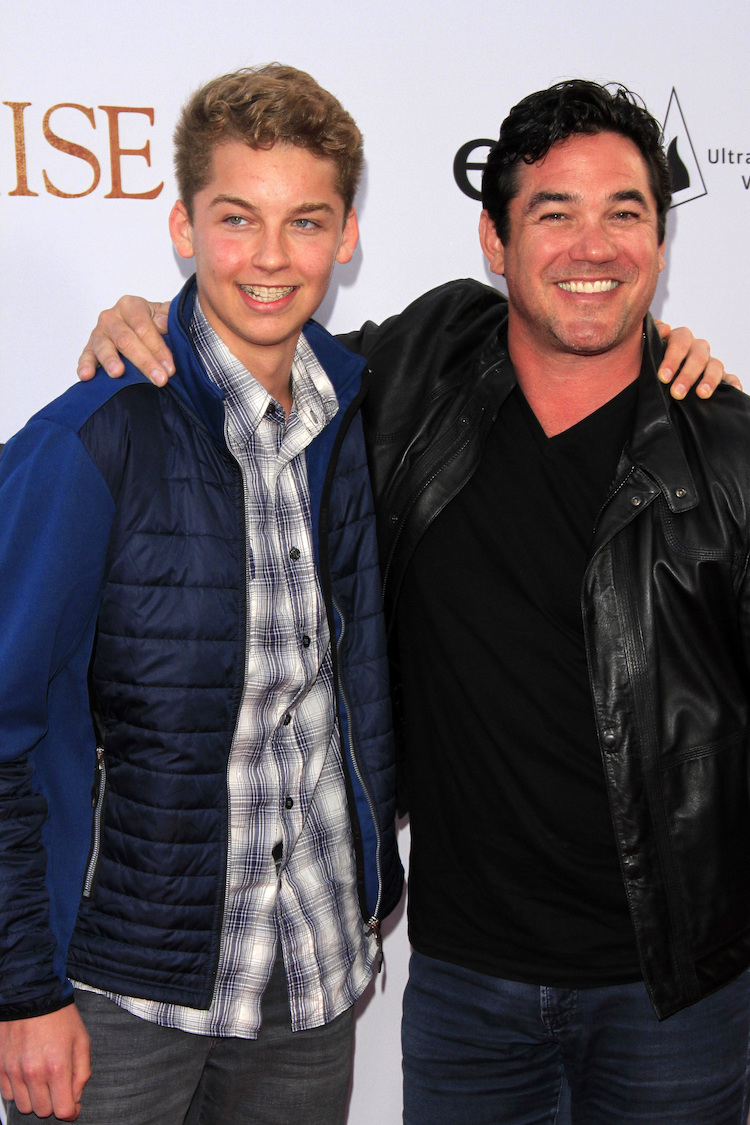
I’m a single father. It was a very difficult time for me. I was really, really limited in the projects I could take, the roles I could play. I wouldn’t be able to take a series. I had to back out because I wouldn’t risk not being with my son. There’s just no possible way.
I remember being so upset, and my little kid coming to me and going, “Dad, it’s going to be okay. God has other plans through this.” And it was shocking, you know, for him to do that.
I’m adopted. My dad adopted me when I was four years old, and I look back at my life and I said, “There are all these moments, if I didn’t have my dad in my life, there are so many wrong turns I would have made.” And there were some turns that I was making that were wrong. And he corrected that journey, sometimes with a firm hand, sometimes it was a harsh word. But I needed both. I just realized where I would be without my dad: nowhere. I could have been finished and done by now. And I realized that then when I was a father, there’s no way I’m not going to be there for my son.
I did the movie God’s Not Dead when my son was in high school, and the whole school went to watch it. The kids knew me because I was around. I coached, I was around and everything. I was always there. That’s the one thing I made sure I was as a father, was there. My dad was always there when anybody asked me about [being] a father like, “Well, what’s your best advice for a father?” I said, “Be there.” That’s the best advice I can give. Just be there.”
Dean’s New Movie – No Vacancy
No Vacancy is a real story. It’s based on a real, true story about Cecil Johnson, and it’s really his journey. I play Cliff Lee, who’s a wonderful guy. I got to meet him, and what a sweetheart of a man.
Sean Young plays a reporter, and she gets stuck in this podunk little town in Florida and has to report on us trying to buy an old hotel for the homeless because at the time, the homeless crisis was really based right there in where we were in Florida. And now, of course, the homeless crisis is right here where I’m based in Los Angeles. I mean, California has half of the country’s homeless population. It’s incredible when you look around here. It’s awful.
So in this film, because a reporter writes a big story about what we’re trying to buy, what we’re trying to do, it gets a lot of people’s attention. And of course, her main subject becomes Cecil Johnson. TC Stallings plays Cecil Johnson, and TC is a great guy, a fantastic actor, and he’s amazing in this.
And just like in It’s a Wonderful Life, the entire community hears about this and comes together to support this ministry, support this homeless shelter, and support Cecil Johnson and it’s lovely. But there are some tough spots in it, as any journey. There are some tough things that happen, especially Cecil’s character, that make you appreciate the journey and it’s very real.
Dean’s Gratitude Practice
Everybody struggles. People look at my life and think, Your life is so good, so easy, everything is just wonderful. And no, it’s never the case for anyone. I humble myself before God every single day because life itself is humbling. And you know, I have a lot of conversations with God, and they happen almost daily. We’ve spoken quite a bit today. There are lots of things that I need guidance and strength on.
“I humble myself before God every single day because life itself is humbling.” – Dean Cain
There’s so much going on with me professionally right now. Sometimes I can get a little lost, but I don’t know—I just feel like there’s always a moment in every day, whether it’s the beginning of the day—I don’t know how long ago I started doing this, but you know, people will wake up in the morning and they go to their phone first thing. I will wake up, and I’ll think of five things to be thankful for. And I’ll thank God for those five things before I start any part of my day. Even that right there grounds me in humility and really sets the tone for a day.
We can all go through and see all the things that are tough for us. But you know, to say five things that you’re thankful for every morning after you get up kind of sets me off on a positive tone. So I just find that to be a wonderful practice.
Narrator: You can see Dean in the movie No Vacancy, which premieres on May 9th. To purchase tickets at one of 700 theaters where the movie will be showing near you, visit novacancymovie.com.
If you’d like to hear more stories about how God can use us through our scars, check out our interview with Michelle Wilbur-Christiansen.
Next Week: Jeanne Celestine Lakin

Narrator: Next time on the Jesus Calling Podcast we hear from Jeanne Celestine Lakin, a survivor of the Rwandan genocide and now nonprofit founder and author. Through prayers and tears, Jeanne tells us her story of learning to forgive those who took everything away from her.
Jeanne Celestine Lakin: God created us with a choice: people can choose to do good, people can choose to do evil as well. So there’s no way of resenting God because He created these people who chose to do the evil work. It wasn’t God with machetes and clubs killing people in Rwanda. It was the people He had created who went away from His love, and decided to hurt and harm other people.
